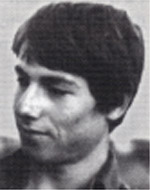Son of Roth and Jacob, was born on January 28, 1961 in Hadera. While Raz was four years old, his mother Ruth died, and he moved to Kibbutz Haogen with his father and younger brother Tal. Two years later, Raz, the Yaffa and bright child with great personal charm, became the leader of his group, dragging his contemporaries into pranks and mischief. A few years later, his father Jacob married Annie and the sisters Ranit and Michal . A strong love relationship developed between the brothers and sisters, a relationship that grew deeper with the years. As early as his childhood, it was possible to discern Raz’s character, which emanated from him in a kind of quiet and restrained power, but he was also blessed with sensitivity and gentleness. His colorful childhood paintings, a colorful texture painted with a confident artist, astonish the richness of their imagination. With his small group, the Shikma group, Raz immigrated to the Ramot-Hefer educational institution. Here his circle of friends grew and expanded, and his personality crystallized. Raz loved Mossad life. He was popular and accepted, and everyone was captivated by his education. In the last years of his studies, his love of sport had driven his interest in school. For more and more time, Raz devoted his training to a field run. Twice he even represented Israel in youth competitions in Europe. When he enlisted in the IDF in 1979, Raz managed to convince the Military Medical Committee that the defect in his heels would not interfere with his service, and that Raz had come to Golani and underwent a period of basic training in a good and cheerful spirit. “I will not be a jobnik,” he said, refusing to study in the course, and he drew a wood – the symbol of the brigade – and wrote: “I love you, Golani! “Raz wrote to his classmate:” From the first day I enlisted, I was not depressed. Anyway less than the others. In basic training I had so good! I met a lot of good and new friends, and the commanders were all ‘on the edge’ – quiet, tough animals. I also enjoyed the training, as it was hard. You can not imagine the difference between the base here and there. This is where every button and brush is kept, and the principle is that for every little thing you are brought to trial or detention. In the Golani Brigade, you feel that you are wanted and that there is a great shortage of people and commanders … “Raz’s struggle to be released from a liaison course in order to reach the Golani reconnaissance unit became desperate, and his father could barely dissuade him. He trusted his high ability, and felt a victim who could not be exhausted. He wrote to the chief of staff and was turned down, and his commanders in the course wondered at the strength of the soldier’s determination, and instead of being punished, they returned him to the Golani Brigade. : “… this guy wants to get to the cruiser, he is very motivated, he has great fitness, he has the power to lead and he is able to drive a whole team … In short, I think he can reach the cruiser and fit in there without problems, even though he did not do anything for three months. “Thank you, AK PS I usually do not like to do or write things like that, but the guy really is good.” Raz was accepted. He spared no effort to regain his strength. His friends helped him. Here, too, they loved him-his honesty and his education, his mischief, his good friend. He regained his temper and soon he helped the others with the running and the drudgery. The training in the commando unit is unbearably difficult. Endless navigational journeys, arduous stretcher journey, parachutes, combat training and variegated survivalAnd hard. All under field conditions, between short sleep periods. Raz loved the special life of the Golani reconnaissance unit and loved his friends. He received his strenuous training in good spirits, without complaints. In a newspaper interview, which was published a few months before the outbreak of the Lebanon war, he confessed to his sincerity: “My problem is different from that of most of the members … I do not like these performance, it does not excite me, I am afraid of it. I do it just because I have to defend it, but I do not have that enthusiasm, it’s not fun, it’s just deep in the mind that you have to do ” On May 6, 1982 Raz fell in battle for the Beaufort. He was brought to rest in his kibbutz, Kibbutz Haogen.
